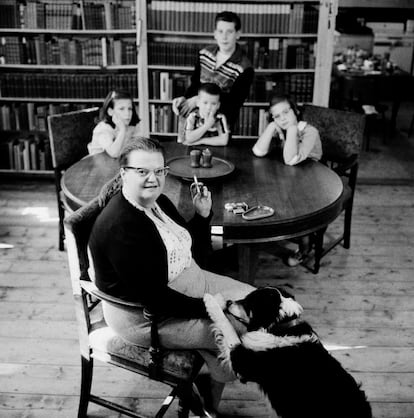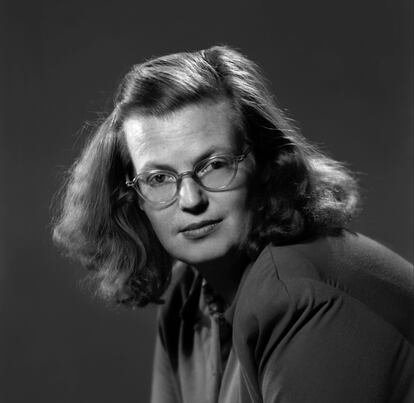The eternal fascination with Shirley Jackson’s haunted houses
It has been more than a decade since the world rescued the Queen of Horror from her modest place in history and, since then, her legend has grown and grown


Her life was short but intense. It lasted just 48 years. She was struck down in 1965 by a heart attack: too much tobacco, a necessarily sedentary lifestyle, and the occasional problem with alcohol. But during those 48 years she was not only the housewife who sometimes wrote, as we insist on remembering her — that was not what she did: her stories were the only means of income for a household with four children. She was the only horror writer who would grow, over time, to eclipse her contemporaries and anyone who came near the genre, because her work would expand until it became a beacon for the rest, resembling a light that guides and never contemplates going out. Since her inclusion in the canonical Library of America in 2010 — something horror writers tend not to aspire to — Shirley Jackson, the author of the disruptive The Lottery, the thrilling The Haunging of Hill House, and the very powerful and twisted voice of Merricat Blackwood (the most famous unreliable narrator in history, who tells the story of We have always lived in the castle), has not stopped growing, and no one has dared to try to follow in her footsteps. But why?
Richard Matheson was an author and to some extent a contemporary of Jackson’s — although at the same time he became an inevitable disciple. His first novel is from 1953, and by then Jackson had been publishing for a decade. She had stood out in 1948, with the hatred that her legendary story The Lottery unleashed, spurring hundreds of readers to write angry letters — the trolls of a time without social media. Matheson could have followed in Jackson’s footsteps, and have found present-day editors determined to make it not only a classic of its genre, but a classic, period. The same could have happened with Daphne du Maurier, the author of Rebecca. But nothing like what is happening with Shirley Jackson all over the world, has happened to them. There is not a year in which letters are not collected — her son Laurence Jackson Hyman edited an anthology in many senses in 2021 —, new biographies (like Ruth Franklin’s) are published, and novels are republished, as has just happened.
“What sets Shirley Jackson apart from the others is that she created something new. She took the genre much further. She took things that are attributed to a tradition, coming from Edgar Allan Poe, and from dark Americana, and she molded them in her own way. What she did is truly prodigious. Literature of the highest level.” The speaker is Valeria Bergalli, head of Minúscula, the publishing house that publishes Jackson in Spain. She has been doing it since 2012. So, when they published We have always lived in the castle, she remembers, “it was difficult for the non-horror reader to be interested, those who already knew her arrived first, because they had been waiting for her.” But the fact that films like Shirley were made about her, streaming series were set in universes that she created — such as Mike Flanagan’s update of The Haunting of Hill House — and, as he himself has admitted on several occasions, Stephen King had learned everything from her, were the reasons her name began to be heard everywhere.

Furthermore, as Bergalli says, “the youngest current writers in the English language have not only highlighted her enormous value, but also that of Gothic literature as a very powerful weapon to narrate the daily lives of women.” One of those authors, Catriona Ward, who has just published Mirror Bay, also has a novel with the same title as Jackson’s publication with Minúscula: The Sundial. “I did it thinking about that work, of course,” confesses the North American writer. “She understood like no one else how everyday life, especially for women, can be as terrifying or more terrifying than anything supernatural. It is because of that, and because of its clear prose, and its dark narrative alchemy, that I return to it again and again when I need a push,” she explains. For Ward it is also evident why her work has grown over time, unlike that of her contemporaries. “She reinvented the Gothic. She created a Gothic for the 20th century. That’s what makes it unique,” she says.
That, and the way she crossed all social boundaries too. “It touched very important nerves in North American culture. She managed to dismantle the idea of community. She made it clear how destructive it can be for those who do not fit in, for those who are different,” Bergalli explains. Something evident in We Have Always Lived in the Castle and in the story The Lottery — in which the battered scapegoat of a community is, evidently, the least loved, the outsider, and its ending is macabre and sectarian — but also in The Sundial, a novel in which a family of women, with a single servant, and a man chosen for his attractiveness, and the sick, old heir — lock themselves in a mansion waiting for the end of the world, separating himself from the others. The make a savage break from what they belonged to or pretended to belong to. In the novel, the desire to see the town and the whole world explode is deafening. “For years, Shirley Jackson was prevented from playing in the big leagues — despite having been nominated for the National Book Award — but she belonged there,” the editor insists.
Her readership has consolidated in Spain, and not only among horror readers. “Each new book generates tremendous expectation at all ages, in both men and women,” says Bergalli, who announces another novelty for this year — which she cannot talk about yet — and the two other novels that are missing for later: The Bird’s Nest and The Road Through the Wall. Celebrate that she is finally abandoning the status of a character who collected esoteric books, ruffled her pets’ fur and was happy at home. You only have to read it to realize how all that affected her — the house is the main character of almost everything she wrote, the house and a woman losing her mind — and how it sowed doubt about what exists and what does not. “If it challenges current readers in any sense, it is in that very sense. It does not create black and white realities. Everything is ambivalent. You can’t trust its narrators, but you can’t trust the world either,” says Bergalli. And yes, the woman who loses her mind in her stories does so because of the instability of a reality inhabited only by herself.

Sign up for our weekly newsletter to get more English-language news coverage from EL PAÍS USA Edition
Tu suscripción se está usando en otro dispositivo
¿Quieres añadir otro usuario a tu suscripción?
Si continúas leyendo en este dispositivo, no se podrá leer en el otro.
FlechaTu suscripción se está usando en otro dispositivo y solo puedes acceder a EL PAÍS desde un dispositivo a la vez.
Si quieres compartir tu cuenta, cambia tu suscripción a la modalidad Premium, así podrás añadir otro usuario. Cada uno accederá con su propia cuenta de email, lo que os permitirá personalizar vuestra experiencia en EL PAÍS.
¿Tienes una suscripción de empresa? Accede aquí para contratar más cuentas.
En el caso de no saber quién está usando tu cuenta, te recomendamos cambiar tu contraseña aquí.
Si decides continuar compartiendo tu cuenta, este mensaje se mostrará en tu dispositivo y en el de la otra persona que está usando tu cuenta de forma indefinida, afectando a tu experiencia de lectura. Puedes consultar aquí los términos y condiciones de la suscripción digital.








































